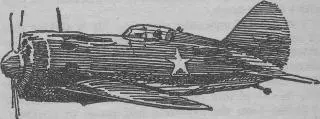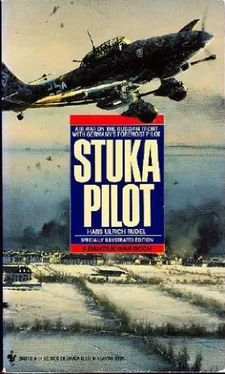Brilliant blue sky, without a rack of cloud. The same even over the sea. We are already attacked by Russian fighters above the narrow coastal strip; but they cannot deflect us from our objective, there is no question of that. We are flying at 9000 feet; the flak is deadly.
About ten miles ahead we see Kronstadt; it seems an infinite distance away. With this intensity of flak one stands a good chance of being hit at any moment. The waiting makes the time long. Dourly, Steen and I keep on our course. We tell ourselves that Ivan is not firing at single aircraft; he is merely putting up a flak barrage at a certain altitude. The others are all over the shop, not only in the squadrons and die flights, but even in the pairs. They think that by varying height and zigzagging they can make the A.A. gunners’ task more difficult. There go the two blue-nosed staff aircraft sweeping through all the formations, even the separate flights. Now one of them loses her bomb. A wild helter-skelter in the sky over Kronstadt; the danger of ramming is great. We are still a few miles from our objective; at an angle ahead of me I can already make out the Marat berthed in the harbour. The guns boom, the shells scream up at us, bursting in flashes of livid colors; the flak forms small fleecy clouds that frolic around us. If it was not in such deadly earnest one might use the phrase: an aerial carnival. I look down on the Marat . Behind her lies the cruiser Kirov . Or is it the Maxim Gorki ? These ships have not yet joined in the general bombardment. But it was the same the last time. They do not open up on us until we are diving to the attack. Never has our flight through the defense seemed so slow or so uncomfortable. Will Steen use his diving brakes today or in the face of this opposition will he go in for once “without”? There he goes. He has already used his brakes. I follow suit, throwing a final glance into his cockpit. His grim face wears an expression of concentration.
Now we are in a dive, close beside each other. Our diving angle must be between seventy and eighty degrees. I have already picked up the Marat in my sights. We race down towards her; slowly she grows to a gigantic size. All their A.A. guns are now directed at us. Now nothing matters but our target, our objective; if we achieve our task it will save our brothers in arms on the ground much bloodshed. But what is happening? Steen’s aircraft suddenly leaves mine far behind. He is traveling much faster. Has he after all again retracted his diving brakes in order to get down more quickly? So I do the same. I race after his aircraft going all out. I am right on his tail, traveling much too fast and unable to check my speed. Straight ahead of me I see the horrified face of W.O. Lehmann, Steen’s rear-gunner. He expects every second that I shall cut off his tail unit with my propeller and ram him. I increase my diving angle with all the strength I have got—it must surely be 90 degrees—sit tight as if I were sitting on a powder keg. Shall I graze Steen’s aircraft which is right on me or shall I get safely past and down? I streak past him within a hair’s breadth. Is this an omen of success? The ship is centered plumb in the middle of my sights. My Ju. 87 keeps perfectly steady as I dive; she does not swerve an inch. I have the feeling that to miss is now impossible. Then I see the Marat large as life in front of me. Sailors are running across the deck, carrying ammunition. Now I press the bomb release switch on my stick and pull with all my strength. Can I still manage to pull out? I doubt it, for I am diving without brakes and the height at which I have released my bomb is not more than 900 feet. The skipper has said when briefing us that the two thousand pounder must not be dropped from lower than 3000 feet as the fragmentation effect of this bomb reaches 3000 feet and to drop it at a lower altitude is to endanger one’s aircraft. But now I have forgotten that!—I am intent on hitting the Marat . I tug at my stick, without feeling, merely exerting all my strength. My acceleration is too great. I see nothing, my sight is blurred in a momentary blackout, a new experience for me. But if it can be managed at all I must pull out. My head has not yet cleared when I hear Scharnovski’s voice: “She is blowing up, sir!”
Now I look out. We are skimming the water at a level of ten or twelve feet and I bank round a little.
Yonder lies the Marat below a cloud of smoke rising up to 1200 feet; apparently the magazine has exploded.
“Congratulations, sir.”
Scharnovski is the first. Now there is a Babel of congratulations from all the other aircraft over the radio.
From all sides I catch the words: “Good show!” Hold on, surely I recognize the Wing Commander’s voice?
I am conscious of a pleasant glow of exhilaration such as one feels after a successful athletic feat. Then I fancy that I am looking into the eyes of thousands of grateful infantrymen. Back at low level in the direction of the coast.

I 16 Rata
“Two Russian fighters, sir,” reports Scharnovski.
“Where are they?”
“Chasing us, sir.—They are circling round the fleet in their own flak.—Cripes! They will both be shot down together by their own flak.”
This expletive and, above all, the excitement in Scharnovski’s voice are something quite new to me. This has never happened before. We fly on a level with the concrete blocks on which A.A. guns have also been posted. We could almost knock the Russian crews off them with our wings. They are still firing at our comrades who are now attacking the other ships. Then for a moment there is nothing visible through the pall of smoke rising from the Marat. The din down below on the surface of the water must be terrific, for it is not until now that a few flak crews spot my aircraft as it roars close past them. Then they swivel their guns and fire after me; all have had their attention diverted by the main formation flying off high above them. So the luck is with me, an isolated aircraft. The whole neighborhood is full of A.A. guns; the air is peppered with shrapnel. But it is a comfort to know that this weight of iron is not meant exclusively for me! I am now crossing the coast line. The narrow strip is very unpleasant. It would be impossible to gain height because I could not climb fast enough to reach a safe altitude. So I stay down. Past machine guns and flak. Panic-stricken Russians hurl themselves flat on the ground. Then again Scharnovski shouts:
“A Rata coming up behind us!”
I look round and see a Russian fighter about 300 yards astern.
“Let him have it, Scharnovski!”
Scharnovski does not utter a sound. Ivan is blazing away at a range of only a few inches. I take wild evasive action.
“Are you mad, Scharnovski? Fire! I’ll have you put under arrest!” I yell at him.
Scharnovski does not fire. Now he says deliberately: “I am holding fire, sir, because I can see a German Me coming up behind and if I open up on the Rata I may damage the Messerschmitt.” That closes the subject as far as Scharnovski is concerned; but I am sweating with the suspense. The tracers are going wider on either side of me. I weave like mad.
“You can turn round now, sir. The Me has shot down the Rata.” I bank round slightly and look back. It is as Scharnovski says; there she lies down below. Now a Me passes groggily.
“Scharnovski, it will be a pleasure to confirm our fighter’s claim to have shot that one down.” He does not reply. He is rather hurt that I was not content to trust his judgment before. I know him; he will sit there and sulk until we land. How many operational flights have we made together when he has not opened his lips the whole time we have been in the air.
Читать дальше













